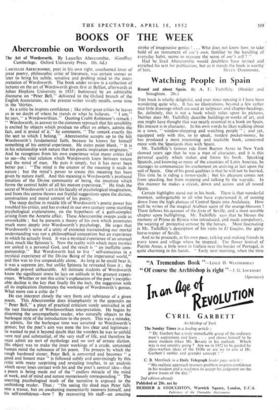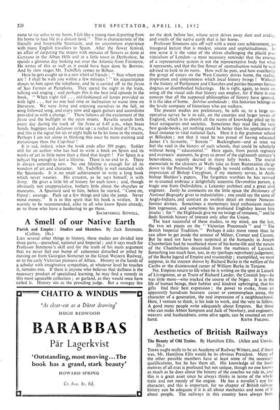Watching People in Spain
THIS book is wholly delightful, and ever since opening it I have becn wondering quite why. It has no illustrations, beyond a few rather nice little drawings which are used as tailpieces and chapter-headings. So, definitely, this is not a book which relies upon its pictures. Neither does Mr. Tschiffely describe buildings or works of art, and one might have thought that was nearly essential in a book on Spain. His interest is in character. In his own words he likes walking about in a town, "window-shopping and watching people " ; and yet, equipped only with this, so to speak, modest pocket-money, he has produced a most interesting and readable book, concerned more with the Spaniards than with Spain.
Mr. Tschiffely's famous ride from Buenos Ayres to New York showed years ago that he was a man of character, and it is this personal quality which makes and forms his book. Speaking Spanish, and knowing so many of the countries of Latin America, he manages to communicate his excitement on arriving at last upon the soil of Spain. One of his good qualities is that he will not be hurried. This time he is riding a motor-cycle ; but his pleasure comes not from speeding, but from stopping and talking by the wayside. In this manner he makes a circuit, down and across and all round Spain. Certain highlights stand out in his book. There is that wonderful moment, unforgettable to all who have experienced it, of coming down from the high plateau of Central Spain into Andalusia. How well he writes of the magical Arabian scent of the orange-blossom ! There follows his account of the feria of Seville, and a most sensible chapter upon bullfighting. Mr. Tschiffely says that he blesses the memory of Primo de Rivera who introduced, and made compulsory, the wearing of protective armour by the horses. Most fascinating is Mr. Tschiffely's description of his visits to El Guajiro, the gipsy horse-trainer of Seville.
And so he proceeds, at his own pace, talking and making friends in every town and village where he stopped. The flower festival of Puente Areas, a little town in Galicia near the border of Portugal, is quite charming in his hands. " Early next morning, when the time
came to say adios to my hosts, I felt like a young man departing from his home to face life in a distant land." This is characteristic of the friendly and hospitable Spaniards, and no uncommon experience with many English travellers to Spain. After the flower festival, an affair of carpeting the streets with mosaics of flowers as done at Genzano in the Alban Hills and at a little town in Derbyshire, he spends a glorious day looking out over the Atlantic from Finisterre. He writes of this as well as it could have been done by Borrow. And by slow stages Mr. Tschiffely comes to Bilbao.
Here he gets caught up in a new whirl of friends : " Stay where you are ! I shall be with you within a few minutes ! " his acquaintance shouts to him upon the telephone, and he is carried off to the fiesta of San Fermin at Pamplona. They spend the night in the train, talking and singing ; and perhaps this is the best told episode in the book. " When night fell . . . old-fashioned oil lamps provided us with light . . . but no one had time or inclination to waste time on literature. We were living and enjoying ourselves to the full, so song followed song, and every now and again guitars and accordions provided us with a.change." There follows all the excitement of the fiesta and the bullfight in the open streets. Reveille sounds forth every day during the week of the fiesta at 6.45 a.m., when brass bands, bagpipes and dulzainas strike up ; a rocket is fired at 7.0 a.m., and this is the signal for six or eight bulls to be let loose in the streets. Perhaps I am not alone in thinking this must be more exciting and picturesque than the Cup-final !
It is sad, indeed, when the book ends after 309 pages. Sadder still for an author who has had to write a book on Spain and its works of art in little more than a third that length ! For Spain is a
• subjxt big enough to last a lifetime. There is no end to it. There is always something new. No one lifetime is enough for all its wonders of art and character. Mr. Tschiffely is well matched with the Spaniards. It is no small achievement to write a long book which never wearies. His concern, as he says himself, is with living. He gives a little bit of history for each town ; and, though obviously not unappreciative, bothers little about the churches or museums. A Spaniard said to him, before he started, "Come on, friend ; courage. Pack up a few things and take the jump. Never mind money." It is in this spirit that his book is written. It is warmly to be recommended, alike to all who know Spain already, or to those who have a hankering to go there.
SACHEVERELL SITWELL.



































 Previous page
Previous page